|
|
My
Life in the Bush of Books, part 6:
From Great American Novels to British Invasions
The Agony Column for
November 8, 2003
Commentary by Rick Kleffel
Having
finished one enjoyable whirl, I stepped right into another. Apparently
I'll keep doing this until I fall off the merry-go-round.
And who can I sue for injury then? I have only myself to blame, having
built the ride, bought the ticket and stepped aboard. I must say that
for the most part I'm enjoying the hell out of all this, other than
the small bits where I wake up in the middle of the night wondering
what's going to cause the fatally embarrassing breakdown in public,
on-the-air,
unavoidable as the oncoming train.
|
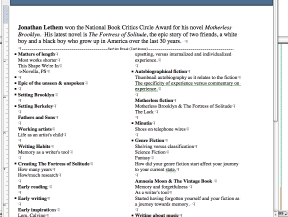
|
|
My tiny-type Lethem cheat-sheet for the interview. |
By the time
I finished interviewing the thoroughly engaging Win
and Meredith Blevins, I was well
into preparation for both the Jonathan Lethem and the Terry Pratchett
interviews. I was quite nervous about
talking to Jonathan Lethem. I was building the interview cheat-sheet
I was planning to take with me, a single piece of paper consisting
of an introduction and two columns of tiny-type questions. This
format had worked well with the Blevins, but there I was in the
rather unique
position of interviewing a husband and wife who seemed to have the
form of telepathy common amongst married couples. How this would
work in a one-on-one setting with a highfalutin' literati was
not particularly
clear. Nor was it clear whether or not Jonathan Lethem was a highfalutin'
literati.
I also started a similar document for Terry Pratchett, with whom I
suspected I would have an easier time, if only because I'd just seen
him at Worldcon, where he seemed the type at whom one could simply
aim a microphone. I was also quite sure that I'd be able to read more
Pratchett than Lethem, simply because the arrival times of the books
and the different reading speeds I suspected each would require.
[Even as I write this column, I've got two documents opened up in
a similar format, one for Colson Whitehead, and one for Gregory Maguire.
Hoping for inspiration or at least a coherent thought.]
|
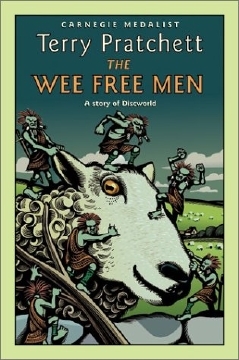
|
|
Terry Pratchett's 'The Wee Free Men' is a bit more somber than than the
other work I'd read.
|
Yes, I admit,
I was enjoying Pratchett's work in the slack-jawed drooling manner
of
a TRUE FAN. That's still true. As this narrative starts
I was partway into 'The
Wee Free Men'', and finding it to be as readable
as the rest of Pratchett, but a little subtler, a little slower
and more pastoral of tone. It's written for the say -- twelve and
up set,
so I even showed it to my fourteen year old son and told him he'd
love it. His response was that he would never read a book with that
title. It only goes to show that you can't predict what kids will
like in any way. In retrospect, I think he'd like Win's novel, 'So
Wild A Dream' a bit more, even though it would seem to be a
tougher read. He [the 14 year-old] has always liked adventure books,
in particular
the work of Gary Paulsen, including 'Hatchet' and 'The River'. Those
both share a man-in-the-wilderness theme with Win's novel.
But Pratchett's work was just fine with me, and much of the best,
I thought, was yet to come. Still, I also had a bunch of Lethem to
choose from in delightfully perfect hardcover first editions. What
to read to inform me for my interview of this very erudite, intelligent
and literary author?
One of the things I do to research before an interview is to look
at other interviews done with the author I'm talking to. That way
if there are questions they simply hate, I can save myself the trouble
of asking them and the authors the trouble of having to be in the
vicinity of someone asking them. I can also avoid asking them the
questions they get asked all the time. For Pratchett that seemed
to be the old "If humor can't be mapped, why are there now maps
for Discworld?" For Lethem, it was quite a bit more nebulous.
|
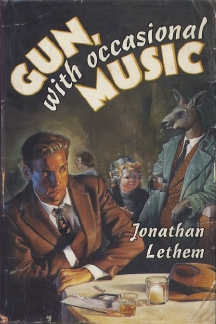
|
|
Jonathan Lethem's first novel features a kangaroo detective. The crinkles
in the jacket are part of the illustration, not evidence of
wear and abuse.
|
Looking at Lethem's oeuvre, which I'd always intended to buy
and read since having read 'Motherless Brooklyn', it seemed
that he had started
out in a very science fictional mode. Terry D'Auray's response
to my announcement that I was interviewing him was that she
loved his
novel where the kangaroo was the detective.
What?
Surely she didn't mean that a kangaroo was a detective?
But that was exactly what she meant. 'Gun, With Occasional Music'
was an initial frontrunner for reading before the interview. In
the first place, it would give me an idea of where Lethem (say
it now:
Lee-thum; practice, because you've been saying 'Leth-um' for all
your time spent reading this author's work, that's years and you're
going
to talk to him and you really, really want to pronounce his name
right, don't you?) got his start. It was short, and it looked
funny, rather
like one of Lem's or Philip K. Dick's japes. But in tone and content
it appeared to have little to do with Lethem's latest novel, 'The
Fortress of Solitude'. In many ways it was the polar opposite;
hyper-unreal SF as opposed to hyper-real Brooklyn memoir; well,
hyper-real except
for the super powers, that is.
But I had just a little over a week to read the Lethem work, and
I was disinclined to read back-to-back-Lethem. Having finished
'The
Wee Free Men', I was already anticipating Pratchett's 'Night
Watch'
and 'Monstrous
Regiment'. Pratchett had opined that his favorite
was the former, while he'd read from the latter and there
were quotes
I absolutely loved in it from when he read and I was hell-bent
on getting him to read those quotes again for the interview.
|
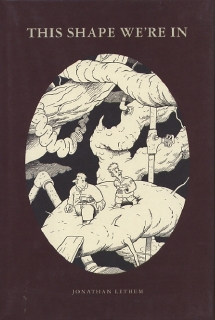
|
|
|
This McSweeney's novella is a beautifully produced hardcover book. |
So looking at my complete collection of Lethem's work, I elect
to read the shortest thing I can find, which is also the most
recent
work. 'This
Shape We're In' is a wonderful little hardcover
published by Dave Eggers McSweeney's Press. I remembered
seeing it when
it came in at Bookshop Santa Cruz, thinking I should get
it, and then
having
it disappear before I could do so. It was also extremely
difficult to get a read on what it was about, where it was
coming from.
I thought at the time, "I should buy that next time I'm in." By
then the small stack of copies was gone; good for Jonathan
Lethem but bad
for me. Thus did I end up buying it from Bella Luna Books,
and thus being short and recent, I read it in prep for the
interview.
I can tell you right now, I never would have guessed what it was
about from what I read on the covers, even though the cover is
a beautiful
literal illustration of events in the story. 'This Shape We're
In' is Lethem at his most absurd, yet it's written in a very literal,
straightforward fashion. It was a one-sitting short novella that
plays
on his favorite themes of memory, of history, and has a wonderfully
imaginative science fiction background. Yet it doesn't read in
the least like science fiction. It's not genre fiction by any
measure.
I enjoyed the hell out of it and wondered how it fed in to the
development I saw in Lethem's fiction from the absurd to the mundane
-- well,
sort of mundane. I framed a few more questions and dove into the
next Pratchett.
|
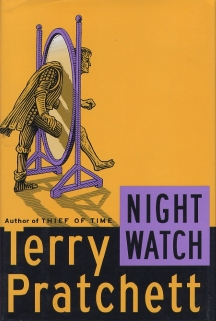
|
|
'Night Watch' is a gritty police procedural set in Pratchett's fantasy Discworld.
|
'The Night
Watch' certainly caught me by surprise, though I suppose it shouldn't
have. I'd heard enough of 'Monstrous Regiment' read
to know that Pratchett wasn't as fantasy-oriented these
days as he was
back when he wrote 'The Color of Magic'. But 'The Wee
Free Men' read pretty much like fantasy to me; well-written and thoughtful,
but yes,
at the end of the day, fantasy. So it was something of
a shock
to encounter the urban cop feel of 'Night Watch'. Yes,
there was a brief
bit of magic in there, to get the protagonist back in
time, but once he was there what you had was one of the grittiest
police
procedurals
I had read in a while. Pratchett really laid it on. Even
as he served up werewolves and other stock-issue monsters from the
fantasy
toolkit,
he created a cop so street-savvy that he wanted thin-soled
shoes to feel the sidewalk so he could tell where he was without having
to
see. And the monsters didn't act like standard-issue fantasy
characters.
They behaved like real people -- with peculiar abilities
-- working in a real city. Yes, like many a reader dropped into a
long-running
series, I had the feeling that I was missing some jokes
about the characters, but that rapidly evaporated as I was caught
up
in the
story. Clearly Pratchett had designed Discworld well,
as a playground where he could do, well, anything.
I found myself filling in questions and comments for my interview
like a madman. I had to reduce the font size twice to
fit them all on a single page. I'd read interviews and force myself
to
look away
when he was talking about books I had in my queue but
had not read yet before the interview; at this point, the next scheduled
Pratchett
was 'Monstrous Regiment' and then, if I had time, 'Mort',
since
I had the sense that 'Mort' was somehow an important entry
in the pantheon.
I had to restrain myself from sending Terry D'Auray my copy of
'Night Watch', just because it seemed to me to be such a strong
mystery.
But she's a busy girl, and even something this good couldn't hope
to get very high in her queue when there were Minette Walters
books to be reading. It's not like either of us needs books. But
then it
is exactly like we both need books.
|
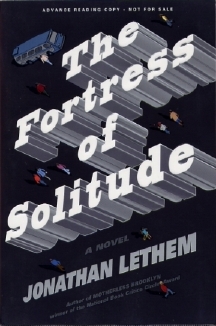
|
|
Jonathan Lethem's Great American Novel is easily one of the best books of this year, and a sure contender, one would hope for any one of a number of awards.
|
The Lethem interview was fast approaching on a Friday, and I had
time to read one more book. I'd obtained his entire catalogue
-- I thought
-- and then realized that I needed 'Girl in Landscape',
which was his most recent novel before 'The
Fortress of Solitude'. I'd
had 'Girl
in Landscape' express shipped to me, but by the time I
was ready to read the final Lethem before the interview, I was unsure
whether
I
could finish it before the interview. I weighed it and
'As She Climbed Across the Table' and decided on the latter, again,
because
it was
the shortest and the most recent besides 'Girl in Landscape'.
|
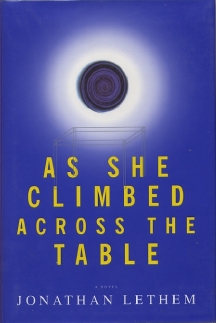
|
|
Jonathan Lethem's romantic triangle includes a black hole with a personality. |
'As She Climbed
Across the Table' was yet another very different
work from the apparently chameleonic Lethem. (Say it again:
Leethem.) Once
again, he uses a very science fictional device in a very
literary fashion. But this isn't highfalutin' literary, it's simply
literature,
and funny as hell at that. 'As She Climbed Across the
Table' is the tale of a romantic triangle, one corner of which is
a physics
experiment,
a selective black hole. It's written with such limpid
simplicity that you can read it in a day if you're fast, but be careful
where
you
read it, because it's going to make you laugh out loud.
It's also going to mess with your expectations at a fundamental level.
You
don't expect physics to be made so clear that it can play
an integral part
in a very cleverly observed romantic comedy. You don't
expect romantic comedy to make you think about the birth of a universe.
You don't
expect academic satire to ring true with acidic insights
into
the male and female mind. And you don't expect it all
to hang together
in a page-turning thriller that seems consummately accessible
to the masses. Yet Lethem does all this and makes it look
easy.
I was still reading 'As She Climbed Across the Table' when I left
for KQED to tape the interview. I stashed in my car, along with
the now-traditional bag o' books that I lug to be signed by the
author.
Yes, I feel like a total dweeb asking them to sign the books and
perhaps I shouldn't. Nobody ever minds or even indicates that
they might possibly
have minded, but I feel that a quote true professional unquote
wouldn't need the books signed. Yet I also feel that a true professional
who didn't need the books signed probably would be able to be as effective
an interviewer as someone who read and loved the books, or at
least read and paid close enough attention to the books to want
them signed.
So I endure my own self-induced sheepishness and bring the pile.
And I've got to say that I love having a pile of wonderful hardcover
first
editions of the authors I interview. It's very fun for this compulsive
book-buyer.
|
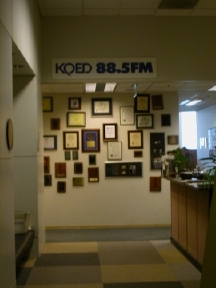
|
|
The lobby within for San Francisco's public radio station KQED.
|
The drive from Santa Cruz to San Francisco is about an
hour and a half. It can be quite beautiful if you take
the 280,
but somehow
the
travel-bots on the web haven't accounted for the 280 yet,
so my drive to the Lethem interview was a slog through
traffic up the
urban-blighted
101. Yes, the 101 does hit the coast and there are some
beautiful views, but it also crawls through territory
all-too-reminiscent of SoCal. Happily, the directions
for getting the studios
after
getting
off the freeway were simple and easy to follow and the "Studio
package" includes free parking in KQED's garage.
|
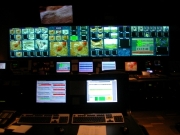
|
|
|
Public TV's version of NORAD. |
I parked almost next to the entrance, watched the doors slide
down and then made my way across the garage floor to the elevators.
A card-key
carrying guard let me in and sent me to the lobby, where two administrative
assistants shared the room with two very expensive LCD monitors
showing current program content. I'd arrived almost an hour early,
since I
was leery of letting myself trust that traffic would not be an
issue. That gave me some time to tool around and see the digs.
KQED is a big, big deal. They're one of the major west coast PBS
radio and TV stations, so I got to peek at a bunch of high-tech
control
rooms filled with monitors showing the paths of incoming missiles
launched from -- no wait, it was Sesame Street. And the Yan Can
Cook. I think I prefer Big Bird to the Big Bang any time.
|
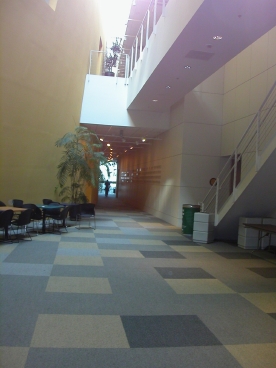
|
|
The atrium of KQED that leads from the lobby to the studios. |
I made my way back to the radio station portion of the building
which is currently in more than a little bit of chaos, as they convert
to a
totally digital operation. There were discarded console shells,
(those expensive pieces of audio office furniture designed for
mixing and
audio/video production) littering the would-be waiting rooms outside
the studios. The studios themselves were the real deal with a
separated control room and recording booth. Since the very kind
studio engineer
was in the control room, I stepped inside, introduced myself and
after a brief bit of explanation, began setting up my laptop so
that I could
record on the laptop as well as a DAT. For although the studios
were in the midst of this high-tech upgrade, they didn't have
CD recorders,
nor could their existing computers simply spit out a CD for me.
Whatever, I was happy enough to be there.
|
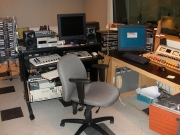
|
|
|
One of the control rooms at KQED studios. |
I got myself set up in the control room, then situated in the
booth. I spent my remaining time gazing stupidly at my cheat sheet,
fussing
with the computer and paging through 'The Fortress of Solitude'.
I was a more than a bit worried about whether Jonathan Lethem
would
even show up, to be honest. He'd just done an interview two days
ago with Terri Gross of Fresh Air. I wouldn't blame him for blowing
off
a local NPR guy.
But of course, he didn't. I moved to the lobby shortly before
he was expected, and he showed up the precisely correct amount
of minutes
early himself. In person, Jonathan Lethem is a very nice, easygoing
guy. We discussed his tour and I was pleased to have caught him
at the beginning rather than the end. We got to the booth, got
ourselves
situated, and then I went back into the control room, turned on
the computer, came back to the booth and started the interview.
|
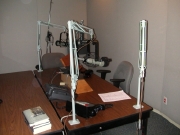
|
|
A recording booth at KQED; the "real thing" with desks and all. |
I was quite at ease because I'd done so much prep for the interview
and Jonathan seemed relaxed as well. In spite of this,
as I launched into my standard issue introduction, I mis-pronounced
his name.
(Say it: Leethumb.) But he was quite understanding, and
once we got going,
we really had a nice conversational connection. Of the
interviews I've done, it was easily one of the most relaxed I've ever
managed.
Of course, I learned that I'd probably made the wrong
decision in reading 'AS She Climbed Across the Table', since had I
read 'Girl in Landscape', I would seen the first incarnation of his
theme of motherlessness. There's a sort of feeling one has when interviewing
that one should pretty much know how a question is going to be anwsered.
But the real fun is when you get an answer you don't expect. We
talked effortlessly until the time was just about up, and I wound
up things
-- which means I 'signed off' the interview and then ran to the
control room to shut down the recording on the computer. Then
while he signed
my books, I frantically saved and edited the interview. That wasn't
easy on the TV-tray-type platform I had the computer sitting on.
It seems to take forever to save these huge audio files, even
on my ripping
new laptop. But I was able to not only save and edit, but to print
out a CD for him, which he (surprisingly to me) appeared to want.
We exchanged email addresses, shook hands, and he was on his way
to a row of signings across San Francisco.
Alas by the time I got to the freeway, a bit of a problem
had developed. A truck had jumped off a 35-foot wall where
freeways
intersected
and dropped onto a car beneath killing the passengers,
stopping the freeway
and creating a "sig-alert"-size traffic jam.
It took almost two and a half hours to get home. But I
brought
with
me one of my
best interviews.
|
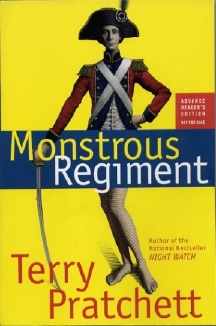
|
|
'Terry Pratchett's latest novel is about an unwisely waged war.
|
That day, I had finished 'As She Climbed Across the Table'. It
was totally wonderful, fun, easy-to-read and yet pithy,
intellectually stimulating. From one high to another, I stepped directly
into
Terry
Pratchett's 'Monstrous
Regiment'. I'd been anticipating reading
this since before Worldcon, where I heard Pratchett read
from this title.
Like a long delayed meal for the famished, 'Monstrous
Regiment' was to be relished, and I did relish it, as well as the
time I
had to
add to the interview list for Pratchett. I whipped through
it in three days, and as I did, I read more interviews on line with
the seemingly
ubiquitous author. How could I have missed him? Well,
it was at
least partly due to my deliberately ignoring the more
popular authors. Pratchett
was obviously a superstar in the UK -- one of the more
common quotes I heard was that 1% of all UK book sales were Pratchett
titles. But
in the US, he hadn't been getting the superstar treatment
until
quite recently.
I enjoyed the hell out of 'Monstrous Regiment' and wrote
a rather ripe review as a result. I was planning on airing
the
review
live as a "Bookend" on KUSP's Fine Print show.
But the review ran to a bit over 1,000 words. So I tormented
my
producers as I
rehearsed the review speaking at lightning speed to fit
it in to the 3-minute
segment. I also tormented myself as to what I should read
next. I had 'Mort' and 'The Thief of Time'. I could tell
that 'The
Thief of
Time' was much closer in sequence to 'Monstrous Regiment'
and 'Night Watch'. And, as I later found out in the interview,
there
was talk
about a Booker prize nomination for that title. But once
again, I let my impatience rule the day, and read 'Mort'
simply because
it
was shorter, but also because it was somehow familiar.
|
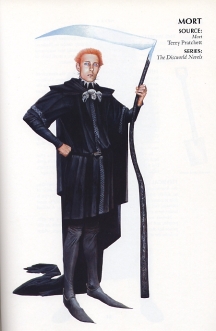
|
|
|
Wayne Barlowe's vision of Mort from the novel of the same title by Terry Pratchett. |
My 17 year-old son pointed out that familiarity to me.
He said, "Dad,
isn't Mort in that Barlowe book we have?" Why yes
he is, as it happens. Mort is illustrated in 'Barlowe's
Guide
to Fantasy',
and
probably in a few other places as well. 'Mort' was quite
good, easily
up to the high standards of the later material. I was
still reading it come Saturday morning, when I was scheduled
to
interview Mr.
Pratchett.
The Terry Pratchett interview was to take place at KUSP, since
he was signing at Bookshop Santa Cruz. But his signing was at
noon, and
I had him scheduled to come in at 10:30 AM. I showed up at about
9:30 AM, and found out that the studio was in use. The gentleman
using
it cleared out fairly quickly and I was almost able to get myself
in and situated at the time I had hoped to. Simultaneously, since
we are a public radio station, a pledge drive meeting was gearing
up in the room outside the studio. It was a fairly chaotic scene.
I trend towards the worrying side of worrying, and I thought that
there was again a good chance that Terry might not show.
It was after all, early on a Saturday morning; well, early for some
people
at least,
though I myself tend to wake up at 4 AM. By now I had
grokked that Terry was something of an international superstar, and
it
seemed perfectly
possible that he might just blow by in a limo waving as
he passed the station. On the opposing side was the argument that
Terry
had in part built up his reading public by dedicated appearances
in the
UK, touring relentlessly to meet his fans. That was the
side that won out, because he showed up quite early. I was barely
in the
studio and only sort of ready. Fortunately, I know the
gear at KUSP well
enough so that it doesn't give me any problems. I shook
hands and handed Terry some of my reviews to read while I finished
setting
up.
I asked him if he remembered the two people in his Discworld
101 panel at Worldcon who had not read his work; ah, yes, I was a
bit of a familiar
face.
When I record at KUSP, I use two DATs and a CD recorder in addition
to my computer. I've never had occasion to regret this and I have
had occasion to be thankful. As Terry read my reviews, he began
commenting on them -- disputing some of my points. Uh-oh, I thought,
this isn't
going well. But then I thought -- this is going well --hell, we
were conversing before I could even get the tape recorder going!
I popped
in a CD, two DATs, hit record on everything, then attempted to
start the interview.
Readers who have listened to other interviews will note that I
like to start interviews with a brief reading by the author on
occasion.
Since I had heard Terry read it at Worldcon, I was absolutely
fixated on having him read the following except from 'Monstrous
Regiment':
|
"But
we are at war!"
"Yes, that's where they've got you," sighed Polly.
"Well, I'm not buying into it. They keep you down, and when they piss off some
other country, you have to fight for them. It's only your country when they want
you to get killed!" said Tonker.
|
Alas, the more we tried to get it going, the more complicated
it began to seem. Terry wanted (rightfully) to set the
scene, though my thought
was that the last paragraph alone said volumes about this
world, let alone Discworld -- and that was my point. But
to set the scene
just
a little required a little bit more, then some more until
Terry and I jettisoned the whole idea and just rambled
off into the
standard-issue
interview -- or so I thought. Terry and I started talking
and the time just disappeared. I glanced up and 45 minutes
were gone.
I glanced
up again and 65 minutes were gone; both DATs had run out
of tape, and we were relying on the CD and computer power
now. In point
of fact, had we started on time, we would have been well
into the time
of his signing. But Terry had lots and lots of really
interesting stuff to say and he was thoroughly enjoying himself, as
was I. We yakked over the hullabaloo of the pledge drive
meeting outside,
which
is probably audible during the latter parts of the interview.
Sorry. When his very kind driver was standing outside
the
studio window pointing
to his watch, and they had a mere fifteen minutes to get
to Bookshop Santa Cruz, I regretfully wound things down,
said goodbye, had
my books signed (oh yes, they were going to get signed!),
and then sent
Terry and his driver on their way. I had no time to give
him the CD of the interview before he left, so I promised
to make them
and show
up at his signing. It was certainly the most easygoing
talk I've ever had with an author.
Pressing the CDs proved to be a lot easier said than done.
We'd gone well over the limit of audio you can put on
a single CD.
This meant
finding a decent stop point, and saving all sorts of huge
files that seemed to grind away for frigging ever. Meanwhile,
my chance
to enjoy
Terry's speech at a local bookstore, and at a time I could
actually be conscious and out of the house, was being
rapidly eroded.
|
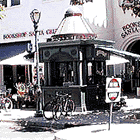
|
|
Bookshop Santa Cruz in the sun. |
It was a bright noon and a beautiful day when I finally
arrived at
Bookshop Santa Cruz. It was also totally, utterly, wall-to-wall
packed with
book bearing, book-buying Terry Pratchett fans. I saw
more than a
few people I knew, and stopped and said hello to some
old friends I hadn't seen in a while. There was a line
of at
least 100 people
to talk to Terry. I hemmed and hawed a bit, but there
was really no contest; I simply stepped up to the podium
and
handed him the
CDs. I hope he was able to keep hold of them. Meanwhile
I looked about
and saw the wonderful new Bromeliad trilogy hardcovers
and thought to myself, "Why, since Bookshop usually has their authors sign
stock, I'll buy one tomorrow signed, after the rush." I
poked about a bit, and then headed home to upload the
interview.
|
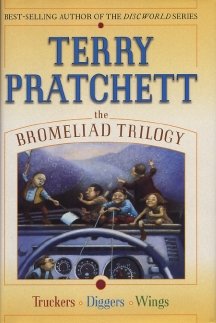
|
|
|
I had to wait about a week after the signing before this book showed up again at BSC. |
The next day, I returned to Bookshop to learn that not only did
they have no copies of the Bromeliad trilogy, they had
no hardcover books
of Pratchett's whatsoever. They had sold out of Terry
Pratchett books, which is something of a shame. Presumably they'll
learn
their lesson.
I finished 'Mort' that day, relaxed and wrote a review,
posted the interview and entered the strangely polite world of alt.fan.pratchett.
There I tried to delicately explain what Terry had told
me, which
was that he preferred not to have interviews transcribed
because it
tended to put words in his mouth. The fans were most understanding,
polite and rather interesting. I've visited it since,
checking out what's up in the satellites surrounding that vast
spinning disc.
By then I was already headed towards my next two interviews, having
seen the Gregory Maguire title 'Mirror
Mirror' resting in the
Inbox at KUSP and having talked to Jonathan Lethem's (Leethumz)
publicist
about a very funny guy named Colson Whitehead. I'd be
doing a bit of reading in the future; by Colson Whitehead, 'The
Intuitionist',
a droll and intelligent take on the detective novel, and
'The Colossus
of New York', a word-lover's feast of fantastic writing
about the titular metropolis. By Gregory Maguire, I'd read 'Mirror
Mirror'
and
'Wicked'. Now, while I'd bought 'The Intuitionist' (twice!)
on my own steam, I'd never quite got round to Maguire. Yes, I'm still
learning.
I'm learning now.
|
|















